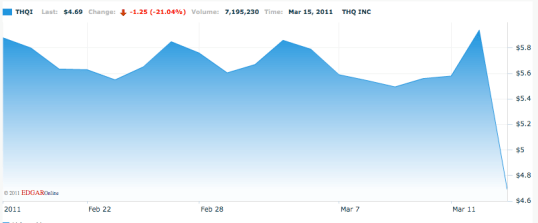Lots of wartime atrocities happen in Homefront: Mass graves, the brutal immolation of enemies and allies and the slaughter of innocents.
But a real-world atrocity hit publisher THQ’s stock yesterday in the wake of lukewarm reviews for its new first-person shooter. The company’s share price went from $5.94 to $4.69, a drop of more than 20%. For some perspective, the highest value for THQ stock came this February when it traded at $6.41 per share, up from a six-month low of $3.52 in September. (‘Homefront’ Review: Shot Through the Heart and Left for Dead)
On infamous review aggregator site Metacritic, the game’s average is a 72 rating (on a scale of 100) based on 32 reviews. The user reviews are even more unkind, flogging it with a 6.9 out of 10. (Incidentally, my review gives Homefront a 7.5 out of 10.) Things looked good for Homefront a few months ago. Many–myself included–thought the gritty story of a Korean invasion of America held promise and the game garnered 200,000 pre-orders, the most in THQ’s history. But, the final product didn’t do enough to impress many critics. Hence, those reviews. It’s still too soon to know what Homefront‘s actual sell-through will be but, with advance word that pegs it as middling, it probably won’t be pretty. The game reportedly cost $35 to 50 million to make and THQ CFO Paul Pucino recently offered that it would need to sell 2 million copies just to break even. (Former UbiSoft Developer to Head Up New THQ Montreal Studio)
Aside from yesterday’s pwnage, the most recent instance of critical reception affecting a video game company’s share price was last October when EA’s share price fell 6% from $17.66 to $16.61. The culprit then was the unkind reviews for the publisher’s controversial Medal of Honor reboot, which put players in modern-day Afghanistan.
Metacritic’s come under fire for being what some call a flawed tool to base employee compensation–or actual merit–on. If the influence of this sort of thinking spreads to financial markets, it only highlights the incongruity of things as subjective as reviews affecting the fiscal fortunes of both individuals and companies. Most critics review games to say if they’re worthwhile experiences, not to render verdicts on how valuable the companies making those games might be.


